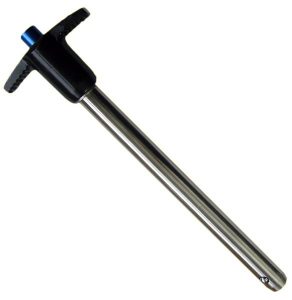
A T-handle is a type of quick-release pin consisting of a T-shaped bar. It features a handle on top that you can grip and turn to engage the machine to which it’s connected. The bottom of a T-handle features a set of balls that locks it into place. In the manufacturing industry, T- handles are typically used to add or remove accessories to a machine, and they are used to make adjustments to a machine.
Thread Size
When choosing a T-handle, you should consider the thread size. Collet-style T-handles have threading on the nosecap. The nosecap consists of internal threading that supports the external threading of the collet fingers. The collet fingers are screwed into the nosecap, allowing them to clamp down. The size of a T-handle’s threading, however, can vary. Some of them have narrow and fine threading, whereas others have thick and coarse threading.
Material
You should also consider the material when choosing a T-handle. Most T-handles are made of steel, with stainless steel being the most common. Stainless steel T-handles offer a superior level of protection against corrosion. They are made of an iron alloy containing chromium. Chromium acts as a shield against rust by preventing the iron within stainless steel from oxidizing. Therefore, stainless steel T-handles don’t rust. Even when exposed to moisture, they’ll maintain a clean and rust-free finish.
T-handles are also made of carbon steel. While they are more vulnerable to rust, carbon steel T-handles are stronger and more durable than stainless steel T-handles. In some cases, carbon steel T-handles can cost less than stainless steel T-handles as well. Both stainless steel and carbon steel are commonly used in T-handles.
Application Requirements
Different applications require different types of T-handles. As previously mentioned, most T-handles are used to make adjustments to a machine or to add or remove accessories. Regardless, you should consider application requirements when choosing a T-handle. The T-handle must be sized to fit the machine for which you use it. If the machine is exposed to water or moisture, you should consider a stainless steel T-handle so that it doesn’t rust.
Specialty
T-handles aren’t one-size-fits-all. If you can’t find a T-handle that fits your application requirements, you may need to order a custom T-handle. Custom T-handles, of course, are designed according to your specifications. You’ll have the freedom to specify the design so that the T-handle is a perfect match for your manufacturing application.
